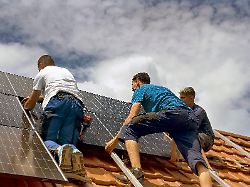Finance minister against EU plan
Lindner rejects further subsidies for the solar industry
March 20, 2024, 9:43 p.m
Listen to article
This audio version was artificially generated. More info | Send feedback
In 2022, more solar panels will be installed in Germany than ever before. The industry is still plagued by crisis, which is why the EU wants to pass further subsidies. Finance Minister Christian Lindner rejects this plan.
Federal Finance Minister Christian Lindner rejects larger subsidies for the solar industry. There is great pressure to invest state funds in solar production. “I am very skeptical here,” said the FDP chairman in Berlin. The expansion of solar power could be supported, as could research in this area. But that should be enough. Solar panels are inexpensive and not a high-tech product, unlike certain semiconductors. Solar panels are also not integrated into further processing supply chains.
In the worst case scenario – if deliveries from China were stopped – production facilities would quickly be set up elsewhere on the world markets. There would only be a short delay in construction on German roofs, said Lindner. However, supply chains would not break in Germany and no security interests would be affected.
The European Union wants to help the crisis-stricken manufacturers of solar panels, but is ruling out a ban on imports from China out of concern that it will not be able to achieve its climate goals. However, cheap imports from the People’s Republic are currently affecting many European manufacturers. Factory closures are on the cards.
Additional state aid is a possible response from the EU. In addition, installers could be pressured to install a certain proportion of EU-manufactured products. Last year, 40 percent more solar capacity was installed than in 2022, reaching a new record level.
